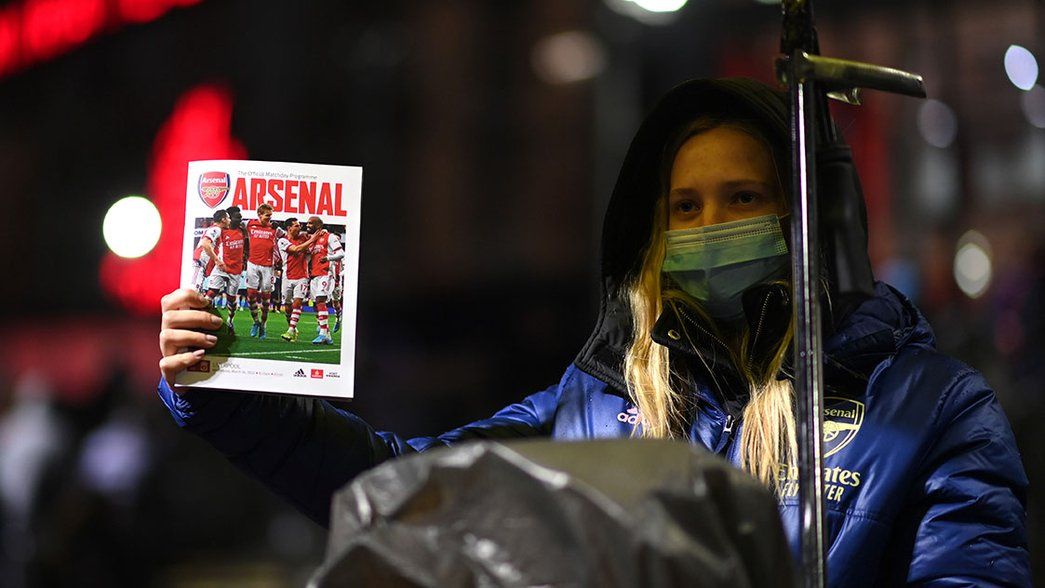Our Employment Programme has many strands. Most of them aim to give disadvantaged members of society the tools, confidence and experience they need to find work, but we also launched a Saturday Jobs Programme to help in a different way.
The idea behind the project was to give 16-18 year olds the opportunity to work for the football club on matchdays. The jobs involved working on nearby stalls, answering supporters’ questions and generally being the first point of contact for fans around the stadium as kick-off approached.
The difference in this project’s target market was clear from its participants. Those who signed up for our Employability course and Job Club, for example, had disrupted work and education histories and were looking for a way back into the job market. Saturday Jobs participants were all in college, studying on a range of courses including BTECs, A-levels and NVQs, and were looking for their first steps into employment.
Arsenal in the Community’s Jack Ferguson, who had experience of volunteering and working on casual and part-time contracts before securing a full-time position, believes this sort of role can really benefit the young people who take part.
“For those individuals who have never worked before it’s a great way of getting different experiences,” he says. “As well as exposing them to the preparation and organisation involved in the whole matchday operation, it teaches them to communicate with the public, listen to briefings, be smart, turn up on time and have confidence. It can be a vital paid work experience that helps them understand employer’s expectations.
“Working for Arsenal helps lots of people take those first steps in the world of work, and having a reference from the football club can be really helpful.”
This is a key strength that Arsenal has, especially in the case of this project. It’s reasonable to believe that young people are attracted by the pull of the football club, where older people are more concerned by the outcome.
“When we first started the focus was on young people and helping them find a way into the world of work when there weren’t too many vacancies,” Jack reflects. “Then we found ourselves in a position in Islington where there were more vacancies than people, especially in the south of the borough where the technology industry took off. So, there were more people looking at the full-time opportunities, but we recognised there was still a skills gap that we have to help bridge.
“Individuals are usually very good at naming the job they want to do, so across the board we have to do lots of work around managing their expectations without killing their aspirations. Of course, if people are prepared to commit time to work towards their goal they know we will be here to support them.”
In time the Employment Programme also offered those who were aged 16 to 18 and were NEET (Not in Education, Training or Employment) an opportunity to do some paid employment for a three-month period within the Saturday Jobs Programme. The idea here was to target individuals who may otherwise have left school without any qualifications or work experience.
Seeing results
In April 2020, the Learning & Work Institute published an independent report into the club’s employability programmes, including Saturday Jobs. Among the many benefits were a variety of “soft outcomes”, of which arguably the most important was helping to improve participants’ confidence and self-esteem. While you might expect confidence to be an issue for those on the Employability course, which includes mock interviews to help people lacking experienced improve their interview performance in stages, Saturday jobs participants also described the positive impact that working with others and helping fans on a matchday had on their confidence.
As one participant said, “Just everything that we do involves interaction, so we’re always talking to somebody. Even if you’re just standing there, you’re still going to talk to someone. So that gradually builds up your confidence, and just me talking to fans makes me more confident every day.”
The other big benefit was motivating participants and giving them a sense of purpose. Those taking part described how they now felt more motivated about a range of aspects of their lives. For example, some of those studying now felt more motivated to complete their college courses because of their experiences on the Saturday Jobs Programme. The programme had developed a greater understanding of employer expectations and employment possibilities, which had given them the drive to succeed in finding a career that suited them.
The Saturday job was, for many, more than just a job.
Copyright 2025 The Arsenal Football Club Limited. Permission to use quotations from this article is granted subject to appropriate credit being given to www.arsenal.com as the source.




